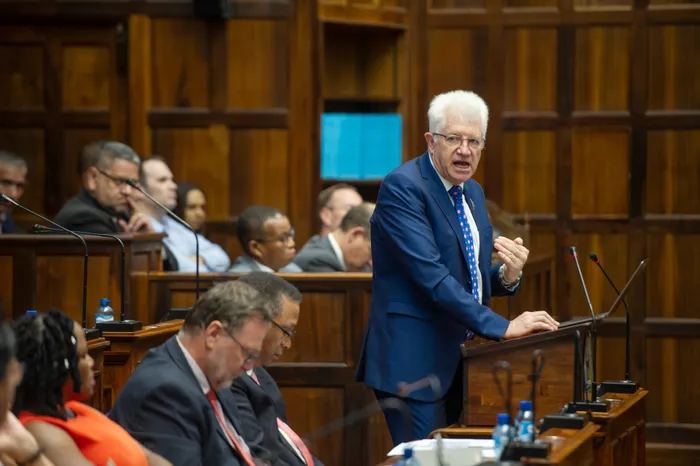
Western Cape Premier Alan Winde.
Image: Armand Hough/African News Agency (ANA)
OUR persistence has paid off.
Western Cape Premier Alan Winde finally released the long-awaited report launched by the Western Cape Police Ombudsman following allegations of capture of the SAPS in the province.
The report was handed over to Winde in 2022, but since then has been kept away from the public. It boggles the mind why the premier adopted this stance, when at face value, the report would have benefited the public, especially communities that are being ravaged by gang violence.
It’s precisely this concern that we (Cape Times editor Siyavuya Mzantsi, content manager Lisa Isaacs, and senior multimedia reporter Nicola Daniels) decided that Winde owed it to the public that he releases the report. We began asking serious questions about why the report continued being kept a secret from the public when KwaZulu-Natal Police Commissioner Nhlanhla Mkhwanazi put his and his family’s life on the line, exposing the alleged infiltration of the SAPS at the national level.
Mkhwanazi named his boss, police minister Senzo Mchunu as being central in aiding criminal syndicates, citing his decision to disband the political killings task team. That's bravery we should all commend and exemplify, especially public representatives.
If Mkhwanazi could risk it all, why has Winde been quiet for three years about a matter so serious that the president of the country established a commission of inquiry to investigate Mkhwanazi’s allegations. Who was Winde protecting, if anyone, by withholding the report from the very same people who are victims of police corruption?
The journey in having these questions answered triggered more concerns, especially when the premier’s office refused to answer some of our questions, but was available to answer questions for other news platforms, emanating from our reporting. Our resolve was also strengthened by the silence of safety and police oversight MEC Anroux Marais and her colleague and party spokesperson on Police Oversight and Community Safety, Benedicta van Minnen. There were also those that attempted to downplay the seriousness of this issue, suggesting we were chasing ghosts.
What came as a surprise was the fact that Ian Cameron, the now chairperson of Parliament’s Portfolio Committee on Police, would suddenly be uninterested in demanding the release of the report when he was most vocal before becoming a DA MP during his time at Action Society.
British historian Lord Acton is attributed as having said: “Power tends to corrupt. Absolute power corrupts absolutely.”
The DA cannot claim to be championing transparency when the truth has to be dragged out of its representatives in government. What it says must be accompanied by action. The police-gang report saga completely dispels its accountable governance narrative.
The release of this report is not only a victory for transparency and accountability, it’s a major victory for the communities in the grip of gang violence. It’s unfortunate that the opposition parties in the legislature never vigorously pursued this matter as we did in our series of articles leading up to the release of the report.
However as journalists, this is what we pride ourselves on. We ask and demand answers on behalf of those communities whose voice often goes unheard. May the release of this report be the start of cleaning up the system that enables gangs to operate with impunity.
Cape Times
Related Topics: